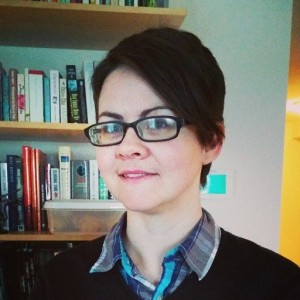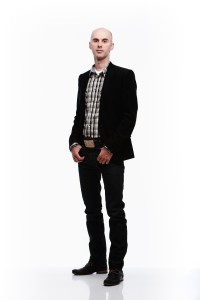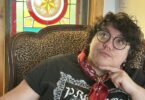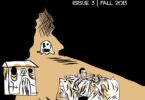For the third annual Emerging Writer Mentorship Award, we invited queer writers who have yet to publish a book to submit their creative non-fiction, as well as a short essay explaining what they hope to gain from a mentorship with Michael V. Smith. We received many compelling applications from writers across Canada. We would like to congratulate Evelyn Deshane on becoming the third recipient of this award.
Evelyn Deshane’s work has appeared in Briarpatch Magazine, The Rusty Toque, Hoax Zine, and the forthcoming Tesseracts 19: Superhero Universe. In 2015, The Steel Chisel released Mythology, a poetry chapbook containing Evelyn’s speculative poetry. Evelyn (pronounced Eve-a-lyn) received an MA from Trent University and is currently studying for a PhD at Waterloo University. You can learn about their collaborations, publications and upcoming events by clicking here.
Over the course of three months, Evelyn will work with Michael V. Smith to develop their non-fiction manuscript.
Michael V. Smith won the inaugural Dayne Ogilvie Prize for Emerging LGBT Writers from the Writers Trust of Canada for his first novel, Cumberland, which was also nominated for the Amazon First Novel Award. He’s since published two poetry books and a second novel, Progress. An improv comic, filmmaker, drag queen, and occasional clown, Smith investigates notions of community and belonging, especially as relating to sexuality, gender, class, and identity. He teaches creative writing in the Faculty of Creative and Critical Studies at University of British Columbia’s Okanagan campus in Kelowna, BC. Michael’s latest book, My Body Is Yours (Arsenal Pulp, 2o15), is a bold memoir in which he comes to terms with his past “failures” at masculinity, and with an aging father he is only beginning to come to know, offering a new way of thinking about breaking out of gender norms, and reconciling with a dangerous childhood.
We asked Michael what he hopes the Emerging Writer Mentorship Award winner will gain from this experience:
In the big picture, I’m hoping the writer will get a clearer sense of what kind of manuscript they are working on, outside of their primary intentions. What we write is rarely specifically what we set out to write. I want to help the writer see more clearly what they’ve put on paper, and nurture that product into its best self. I’m hoping we’ll see beneath the surface of the work for the subtler ideas at play, and that we’ll tighten the theme and broaden its reach–open or close doors in the work, as necessary.
On a smaller scale, I hope we can work on the rhythm and sense of the sentences, look at diction, at tone, and at the shape and length of a phrase, and improve our understanding of how the small parts feed the big ideas.







